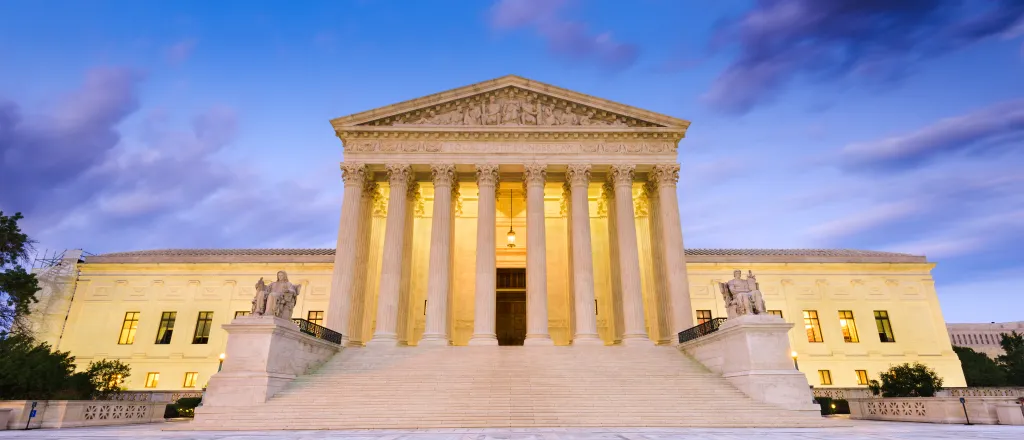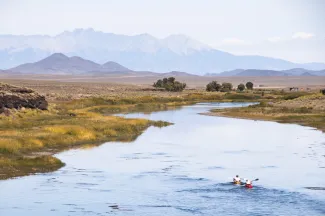
Supreme Court overturns water rights agreement in Texas, New Mexico case
© iStock - SeanPavonePhoto
(The Center Square) – The U.S. Supreme Court in a ruling Friday halted an agreement reached by Texas, New Mexico and Colorado that would have secured crucial water allotments for Texas farmers.
In Texas v New Mexico and Colorado, the court ruled 5-4 to reject an agreement reached in November 2022, arguing it would defy a ruling it issued on the matter in 2018.
It also rejected an argument made by the special master the court appointed who asked the court to approve the agreement.

© joshschutz - iStock-133883324
At issue is a 1938 Rio Grande Compact agreed upon by the states of Texas, New Mexico and Colorado and approved by Congress to equitably apportion the waters of the Rio Grande River. The river originates in Colorado and flows through New Mexico and Texas as a vital water source. Due to the massive agricultural reliance on its water, only 20 percent of is estimated to reach the Gulf of Mexico.
In 2013, Texas sued, alleging New Mexico was unfairly syphoning water from the river before it reached Texas. New Mexico counterclaimed, alleging Texas violated the compact. After years of dispute, the Rio Grande Compact Commission, a body of commissioners from each state, reached an agreement in a special meeting held in November 2022. After they reached the agreement, the Biden administration objected to the terms. The states asked the special master, and eventually the Supreme Court, to intervene and approve their agreement over the administration’s objection.
In July 2023, the special master ruled in favor of the agreement saying it “resolves the dispute over the Texas and downstream New Mexico apportionments and protects the Texas apportionment ... against New Mexican actions. ... [I]t is difficult to envision a resolution to this matter that might be superior to the Consent Decree [that Texas seeks].”
Friday, the Supreme Court rejected the states’ and the special master’s arguments.

Associate Justice Ketanji Brown Jackson - Wikimedia - Public Domain
Justice Ketanji Brown Jackson delivered the opinion for the court and was joined by Chief Justice John Roberts and Justices Sonia Sotomayor, Elena Kagan and Brett Kavanaugh.
Justice Neil Gorsuch wrote the dissent and was joined by Justices Clarence Thomas, Samuel Alito and Amy Coney Barrett.
The court already ruled on the matter in 2018, Jackson argued, when it held that New Mexico violated the contract and subsequently restricted New Mexico’s groundwater pumping. It also held that the federal government has valid compact claims.
In Friday’s ruling, she argued the court wasn’t restricting states’ rights. “Although the United States must generally comply with state law when impounding water for use in a federal irrigation project,” she said, the Biden administration “does not seek to skirt any state law here.”
She also argued the states’ agreement would reverse the Supreme Court’s previous ruling that New Mexico was in violation of the compact. “Because our precedent does not permit that result, the states’ motion to enter the consent decree is denied.
“Our decision today follows directly from our prior recognition of the United States’ distinct federal interests in the Rio Grande Compact. Having acknowledged those interests, and having allowed the United States to intervene to assert them, we cannot now allow Texas and New Mexico to leave the United States up the river without a paddle. Because the consent decree would dispose of the United States’ Compact claims without its consent, the United States’ exception is sustained, and the States’ motion to enter the consent decree is denied.”
In the dissent, Justice Neil Gorsuch said the agreement would fairly apportion water from the Rio Grande River between Texas and New Mexico and quoted the special master’s reasoning.

Associate Justice Neil Gorsuch - Wikimedia - Public Domain
“Still, the Court denies entry of the consent decree. Why? Because the federal government demands as much,” he wrote.
“The Court’s decision is inconsistent with how original jurisdiction cases normally proceed. It defies 100 years of this Court’s water law jurisprudence. And it represents a serious assault on the power of States to govern, as they always have, the water rights of users in their jurisdictions. The Special Master issued a detailed 115-page report laying all this out. His views were wise, his recommendations sound, and, respectfully, we should have done as he suggested.”
Texas Attorney General Ken Paxton agreed, saying the ruling was political and the court “rejected that agreement at the behest of the Biden Administration, thereby allowing the federal government to interfere with agreements between the States within their own jurisdictions.”
He said he was “disappointed … that a narrow majority … unfortunately and incorrectly granted the federal government even more power over the States.”
“Every State in this case and even the special master appointed by the Supreme Court itself supported the consent decree that would put an end to more than a decade of litigation and ensure Texas farmers have access to vital water supplies. However, the Biden Administration objected, claiming that they can unilaterally block the States' resolution of a dispute between the States themselves. We will continue to work to ensure that the rights of Texas farmers are protected during the next steps of the process.”
















